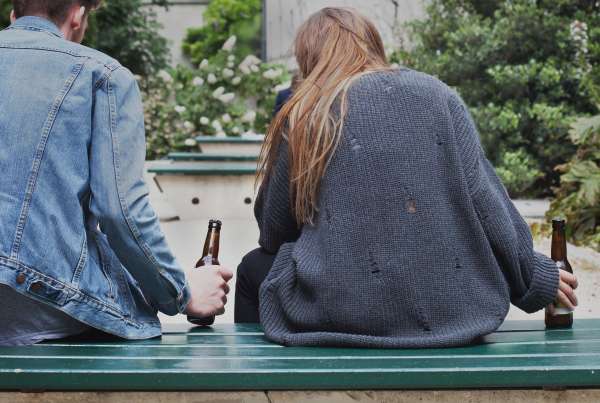Underage drinking is an ongoing problem in the United States, making it essential to recognize the early signs of alcoholism. Recent government data indicates that nearly a third of high school students have had alcohol in the past month, and up to 14 percent “binge drank,” meaning consumption of more than four alcoholic beverages in a single drinking session. Even more frighteningly, an estimated 5 percent of high school drivers drove drunk in the last 30 days. That’s one in twenty learner’s permit holders.
An admittedly important detail to note is that things used to be much worse. Fewer teens are drinking today than in decades past. However, that shouldn’t lessen the fervor with which this topic should be addressed.
Frequent teenage alcohol consumption can lead to life-long negative impacts on their physical and mental health, affecting memory and cognition, personality, rates of depression and anxiety, and a risk for both victimization and perpetration of physical and sexual violence.
But there’s still a considerable difference between dabbling with alcohol as a teen and becoming an alcoholic. Understanding when that gap is bridged, and the warning signs leading up to it is important.
What are the Early Signs of Alcoholism?
While it’s one thing to discipline a child about being reckless with an illegal taboo, a diagnosis of teen alcoholism is a condition that requires immediate professional attention. Teen alcohol use disorder is a mental health condition and one requiring a dedicated treatment plan. Let’s look at some of the more common early signs of teen alcoholism.
1. Frequent Mood Shifts and Irritability
Mood stability can be a helpful gauge of a teen’s mental health. It’s normal to be sad when bad things happen, happy when good things happen, and neutral on some days.
Teens may overreact or appear more or less emotional on some days than others, and the reasons for their reactions might be unknown to you. It could be that their favorite band is breaking up or that their friend has been stressing them out about something. It could be that they’re just upset about something not quite going their way.
But when a teen’s mood is wildly unstable and shifting heavily between deep sorrow and a manic level of energy, something may be wrong. It doesn’t necessarily have to be an addiction. A consistently low mood over several weeks can be a sign of depression, especially if there is no recognizable trigger event or known cause. An episode of depression followed by a manic episode several weeks or months later may be a sign of another mood disorder.
However, if these shifts in mood follow a recognizable pattern that might indicate that they have something to do with drinking or drug use – such as occurring every time a teen goes out with their friends, comes back from “studying,” or after coming home late from school – they may be a strong indicator of an ongoing drug problem, especially if they are frequent.
2. Lying About Their Drinking Habits
Lying is a powerful trick that teens get better and better at with every year of practice. They’re no longer children, and some teens hide the truth better than others.
But if you can catch them in a lie, then the willingness to lie about frequent drinking may hint at more than just a reluctance to tell you about their recent escapades – they may be specifically trying to hide just how much they’ve been drinking, out of fear, shame, or worry.
3. Frequently Coming Home Drunk
Teens are drinking less than they have in decades past – so chances are that you or your friends have had their fair share of high school drinking stories.
But there’s a difference between getting away with a few beers and coming home drunk multiple times a month or every week. Frequent drinking, while not a strict prerequisite for alcoholism, almost always leads to it.
4. Performance and Personality Changes
Anyone can get addicted to anything. One of the dangerous things about addiction is that we sometimes assume it only happens to “bad” people. In one way, that’s the fault of misrepresentation – many unsavory characters in films and books are described as drunks or addicts, and some of their worst traits come out when they’re using.
But the truth is that drugs like alcohol can have a significant impact on a person’s mind and personality. “Good” kids are still at risk for teenage drinking and addiction. A teenager may be overwhelmed by the responsibilities and expectations weighing on them and may feel they’ve earned the chance to relax for once. They might find themselves depending on alcohol to soothe their anxieties. Or maybe it’s their way of rewarding their hard work on social occasions, then with close friends, and lastly, at home, in private.
Anyone can get addicted and have their life severely changed by their addiction. There is no moral element to drug use. It is like any other disease: a destructive condition that can be identified and treated.
5. Hiding Alcohol at Home
In addition to lying about drinking, coming home frequently drunk, and behaving abnormally as of late, another common indication of teen alcoholism is private drinking.
Like adults, teens might hide drinks in their room, in their bag, or somewhere else where they can grab a drink to soothe themselves after a long day or to hide from everyone.
6. Showing Up Drunk
At a certain point, it becomes difficult to hide the drinking. Alcoholism is progressive with how much it makes you drink to the point where you may spend more waking hours drunk than sober.
That can mean showing up to school drunk, showing up at social gatherings already drunk, and even driving drunk on multiple occasions.
7. Multiple Occasions of Alcohol Poisoning
Alcohol is not only addictive – it is poisonous. Too much alcohol in one drinking session can lead to vomiting, lapses in memory (blackouts), breathing difficulties, and loss of bowel control.
Teens are especially at risk of alcohol poisoning because they may have no gauge for how much is too much and because they are less physically capable of handling alcohol than a fully-grown adult. But multiple episodes of alcohol poisoning can be a definitive sign of a serious problem. Binge drinking and alcohol poisoning can lead to an early death. Each year, alcohol claims the lives of over 3,500 people under the age of 21.
The Difference Between Drinking and Addiction
The line between having experience with alcohol as a teen and being a teen alcoholic is a fine line. Only a professional can make a proper diagnosis of a teen’s symptoms and determine a substance use disorder.
But the general rule of thumb is that the difference between drug use and a drug use disorder is determined by whether a person’s usage is significantly and negatively affecting them – and whether those negative consequences have led them to stop.
A teen who continues to drink despite driving away their friends, struggling in school, and straining their relationships at home is more than likely suffering from a serious drinking problem.
If you believe you or a teen loved one is struggling with alcohol use, then convincing them to get immediate help is important. Alcohol is among the most dangerous and destructive drugs due to its ubiquity, availability, and impact on both the body and mind. Early alcohol addiction can ruin a life. But getting help as soon as possible can reverse some of the impacts that alcoholism has and bring a teen the chance at a long and fulfilling life without addiction.







